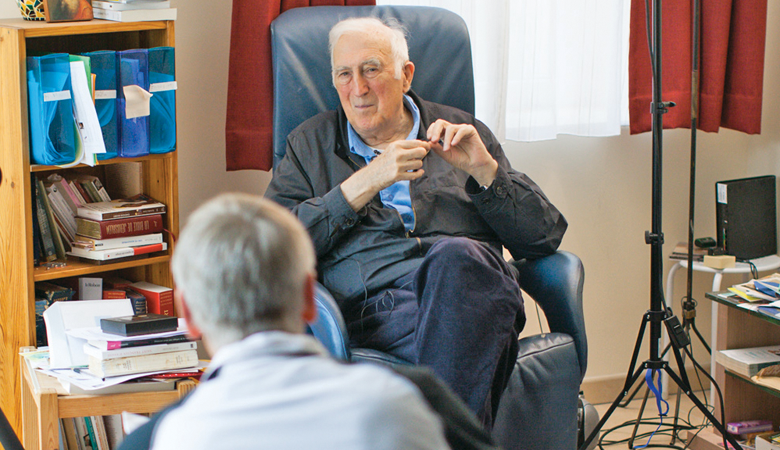Dr. James Read, director of The Salvation Army Ethics Centre in Winnipeg, and Dr. Aimee Patterson, a Christian ethics consultant at the Ethics Centre, reflect on recent, troubling news about Jean Vanier, the founder of L’Arche, a network of communities where people with and without intellectual disabilities live, work and grow together, celebrating the unique gift of each person.
Dear Jim,
Jean Vanier. What can I say in the wake of learning that the founder of L’Arche engaged in sexually, emotionally and spiritually abusive relationships with at least six women?
Dear Jim,
Jean Vanier. What can I say in the wake of learning that the founder of L’Arche engaged in sexually, emotionally and spiritually abusive relationships with at least six women?
I’ve used Vanier’s words so many times. He could always get to the heart of what it means to love and be loved by people swept aside by society. My deepest concerns, however, lie not with the Vanier who spoke so eloquently about community and compassion. I’m sure the time will come when I use his words again. I’m more troubled by the Vanier who lived out his message. He knew he wasn’t a saint; he admitted as much. Even so, he offered a potent example of a Christian life marked by obedience and liberation, one deeply embedded in relationship with “the least of these.”
My deepest concerns address good, evil and trust. How can the person who used his power to advocate for disabled people be the same person who used his power to exploit and abuse women? And how can we trust people who seem to be trustworthy, knowing we are all capable of such betrayal?
—Aimee
Dear Aimee,
I hear what you are saying. The Saturday morning when the story broke, I learned about it through a friend. My immediate reaction was, “Tell me it’s not true!” I was incredulous. It was so much at odds with what I knew of Jean Vanier. In my mind, he was not only someone I looked up to as a fellow Canadian philosopher, but someone I admired for his gentle, self-effacing, almost saintly demeanour. When he delivered his Massey Lectures in 1998, he didn’t leave his humble home in Trosly-Breuil, France, for the bright lights, big crowds and gala celebrations he would have received in Toronto. It all seemed consistent with the message he preached.
So, to learn that this same Vanier had sexually abused anyone, let alone six people, completely blew me away. It didn’t fit at all.
Of course, I didn’t know him first-hand, so I wonder, had I been jumping to conclusions about Vanier’s character? Did he simply have good PR? Terry O’Reilly’s CBC radio show Under the Influence regularly reminds me how skillful some image-makers are.
You ask how we can trust others. Good question. But right now, I question my own judgment. Am I too ready to trust?—Jim
It’s an awful thing to have to question your own judgment—to feel the shame of being duped. Vanier himself said, “Can you trust another if you don’t trust yourself?”
We’re all called to be trustworthy. And mutual trust is critical for mentoring and pastoral care relationships. You and I have taught about the power dynamics that exist in these intimate relationships. When the person holding greater power is accountable to an authority outside the relationship, he is less likely to deceive himself into thinking he has no power. Accountability can help prevent exploitation of the vulnerable person, contribute to a sense of safety, and build trust in the relationship.
Jesus said a good tree is recognized by its fruit. L’Arche has been applauded for having the integrity to investigate claims and openly share their findings; for breaking the news to core members gently and supportively; and for persisting in creating communities of belonging. This is good fruit—reason, I think, to trust the organization.
But Jesus also said wolves come in sheep’s clothing, which makes assessing a person’s character by their actions sound much more complicated. Was Vanier pulling the wool over our eyes? Perhaps there are parts of him I can trust and other parts I cannot.
—Aimee
Dear Aimee,
One of my definitions of worship is “complete unreserved trust.” When coupled with the commandment to have no other gods besides God (see Exodus 20:3), this means the degree of trust I put in anyone or anything else should be limited. The revelations about Jean Vanier are a reminder of the importance of limiting trust.
This morning I heard someone say, “I trust science and scientists.” In the context of COVID-19, I take the speaker to mean that he wants decisions about quarantine to be based on what is actually known about the spread of infections, not on the basis of a powerful politician’s gut feelings. Still, it made me pause. Nowadays, where do I and others put our trust— our total, unquestioning trust?
Jean Vanier clearly did not deserve it. But then, who does? Not the smartest scientist or the shrewdest financier or the best church. Only God deserves worship. It seems that I regularly need to remind myself of that.
However, I also need to remember that, as a friend once told me, “Even a stopped clock is right twice a day.” Even flawed characters like Jean Vanier can say some really important things. And the transformation that L’Arche has made in the lives of many intellectually disabled adults—and those who share life with them—is huge. I think it’s true that “sharing our weakness and difficulties is more nourishing to others than sharing our qualities and successes,” and if it is, then could taking note of Vanier’s weaknesses, in the right way, be more nourishing than taking note of his qualities?
Grace and peace in abundance.
—Jim
Photo: Warren Pot
My deepest concerns address good, evil and trust. How can the person who used his power to advocate for disabled people be the same person who used his power to exploit and abuse women? And how can we trust people who seem to be trustworthy, knowing we are all capable of such betrayal?
—Aimee
Dear Aimee,
I hear what you are saying. The Saturday morning when the story broke, I learned about it through a friend. My immediate reaction was, “Tell me it’s not true!” I was incredulous. It was so much at odds with what I knew of Jean Vanier. In my mind, he was not only someone I looked up to as a fellow Canadian philosopher, but someone I admired for his gentle, self-effacing, almost saintly demeanour. When he delivered his Massey Lectures in 1998, he didn’t leave his humble home in Trosly-Breuil, France, for the bright lights, big crowds and gala celebrations he would have received in Toronto. It all seemed consistent with the message he preached.
So, to learn that this same Vanier had sexually abused anyone, let alone six people, completely blew me away. It didn’t fit at all.
Of course, I didn’t know him first-hand, so I wonder, had I been jumping to conclusions about Vanier’s character? Did he simply have good PR? Terry O’Reilly’s CBC radio show Under the Influence regularly reminds me how skillful some image-makers are.
You ask how we can trust others. Good question. But right now, I question my own judgment. Am I too ready to trust?—Jim
My immediate reaction was, “Tell me it’s not true!”Dear Jim,
It’s an awful thing to have to question your own judgment—to feel the shame of being duped. Vanier himself said, “Can you trust another if you don’t trust yourself?”
We’re all called to be trustworthy. And mutual trust is critical for mentoring and pastoral care relationships. You and I have taught about the power dynamics that exist in these intimate relationships. When the person holding greater power is accountable to an authority outside the relationship, he is less likely to deceive himself into thinking he has no power. Accountability can help prevent exploitation of the vulnerable person, contribute to a sense of safety, and build trust in the relationship.
Jesus said a good tree is recognized by its fruit. L’Arche has been applauded for having the integrity to investigate claims and openly share their findings; for breaking the news to core members gently and supportively; and for persisting in creating communities of belonging. This is good fruit—reason, I think, to trust the organization.
But Jesus also said wolves come in sheep’s clothing, which makes assessing a person’s character by their actions sound much more complicated. Was Vanier pulling the wool over our eyes? Perhaps there are parts of him I can trust and other parts I cannot.
—Aimee
Dear Aimee,
One of my definitions of worship is “complete unreserved trust.” When coupled with the commandment to have no other gods besides God (see Exodus 20:3), this means the degree of trust I put in anyone or anything else should be limited. The revelations about Jean Vanier are a reminder of the importance of limiting trust.
This morning I heard someone say, “I trust science and scientists.” In the context of COVID-19, I take the speaker to mean that he wants decisions about quarantine to be based on what is actually known about the spread of infections, not on the basis of a powerful politician’s gut feelings. Still, it made me pause. Nowadays, where do I and others put our trust— our total, unquestioning trust?
Jean Vanier clearly did not deserve it. But then, who does? Not the smartest scientist or the shrewdest financier or the best church. Only God deserves worship. It seems that I regularly need to remind myself of that.
However, I also need to remember that, as a friend once told me, “Even a stopped clock is right twice a day.” Even flawed characters like Jean Vanier can say some really important things. And the transformation that L’Arche has made in the lives of many intellectually disabled adults—and those who share life with them—is huge. I think it’s true that “sharing our weakness and difficulties is more nourishing to others than sharing our qualities and successes,” and if it is, then could taking note of Vanier’s weaknesses, in the right way, be more nourishing than taking note of his qualities?
Grace and peace in abundance.
—Jim
Photo: Warren Pot








When we have a good relationship or positive regard for someone, areas of our brain are engaged that contribute to an overall feeling of well-being and social reward. Even if we have two identical interactions with two different people, we will see the interaction with a person we trust more positively than with one we don't. So our predisposition to trust can sometimes override logic. That is when we are vulnerable to being hurt or taken advantage of.
I don't say this to suggest that we shouldn't trust in people at all. Trust is essential to successful community relationships, even if there is some inherent risk. But a good measure of rational skepticism is important too, especially in a world where we encounter scams on a regular basis. Personally, I can only think of one person who I would trust completely and that is my wife. I have had my trust betrayed too many times to realistically think otherwise. I don't see that negatively. On the contrary, it helps me see the world more accurately and better poised to live a forgiving existence. Cheers.